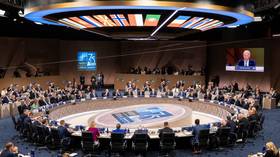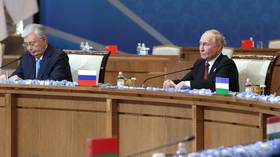Fyodor Lukyanov: Could NATO learn something from India’s Modi?

Two events – Indian Prime Minister Narendra Modi’s pomp-filled visit to Moscow and the 75th anniversary NATO summit in Washington – coincided this week. The coincidence is remarkable because they illustrate two contrasting models for organising inter-state relations. The direction of world politics will largely depend on which of them prevails.
Russian-Indian relations are a vast and complex phenomenon. Common historical and cultural roots, and intertwined goals and objectives in a number of areas, contrast with divergent interests in others that are no less important to the parties and are not a complete alignment of ideologies and worldviews.
The relationship deserves the most serious analysis, but here, without going into detail, we will limit ourselves to its typological characteristics. It is not a union based on commitments. We would venture to say that it is not a strategic partnership either (although that is the term officially used). The two countries simply have different strategies, and at the moment these are changing due to the extreme uncertainty in the world around them. The partnership is close (political storms cannot yet destroy it), but it is more tactical – both Moscow and New Delhi need each other to achieve certain goals, and each of them are their own. Tactical in this context means permanent, not temporary, but changing in content. And it requires not rigid rules but, on the contrary, the ability to adapt to changing circumstances.
Modi’s warm welcome and sincere appreciation do not mean that both sides will stop maneuvering to achieve the most effective engagement with their other major counterparts – the US in India’s case and China in Russia’s. Moreover, both capitals will do their utmost to ensure that relations with the latter are strengthened and expanded in parallel. Here too, hesitations and resentments are inevitable. The essential difference is that both Moscow and New Delhi have a vital interest in ensuring that these partnerships are not cancelled or weakened. All this sounds a little florid and not very sober, and therefore not very practical. But if we look at how most countries around the world are now trying to behave, it turns out that such a complex ‘shifting geometry’ of interests appeals to many.
The exceptions are the countries now gathered in Washington for the NATO summit to mark its 75th anniversary. NATO is a classic alliance, united by bloc discipline, proclaiming a common set of values, and clearly identifying adversaries of both a military-political and ethical (ideological) nature. The purpose of meeting at the highest level is to demonstrate this unity to others. Until recently, the purpose of it was expansion – and it was assumed that this did not involve serious risks. Now it has turned out that it does, and a dilemma has arisen. Leaders must choose whether they want the right to expand at any cost, which increases the threat to existing members, or would rather make the club “exclusive” in the existing composition. Whichever choice is made, the binding nature of the alliance relationship goes without saying. Individual deviations, such as Turkey or Hungary, may occur, but they have not yet affected the general principle in any way and have not really threatened the overall uno voce.
The Ukrainian conflict has only underlined the binding nature of relations within NATO. It would be an oversimplification to think that the mobilisation against Russia was only due to pressure from the main power in Washington. The crisis situation has triggered the bloc instinct, according to which, when there is danger, they must line up and close ranks. The alliance is only strengthened when the situation deteriorates. Commitments within a bloc deliberately limit freedom of action and choice, but in return they give (or should give) guarantees of security and the benefits of preferential interaction in a closed circle.
So there are two kinds of relationships. One is peculiar to the community that we now call the global majority (which is, in fact, most of the world’s countries and population). Here, rigid ties are not the done thing. The main message is that if contacts with someone contribute to your own development, to solving your own vital problems, you shouldn’t give them up because of obligations to someone else. Another is that the Atlantic world (a clear minority of the planet’s inhabitants, although extremely influential) is different. There is a value system and a geopolitical community and belonging to it implies restrictions on other ties.
There is no point in debating which is better and which is worse; they are simply two different approaches. For a long time it was thought that the second was the most promising, and that all others should either fit into that community or build their own on the same principles. Now it seems increasingly likely that the future lies in the former. Most likely, both variants will continue, but the Atlantic path will become more and more exclusive, and fit a very specific culture. And the majority will live differently, in some ways interacting with the minority and at other times bypassing it.
This article was first published by Rossiyskaya Gazeta newspaper, translated and edited by the RT team














